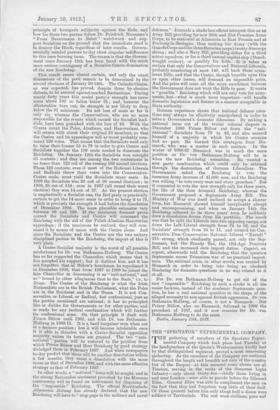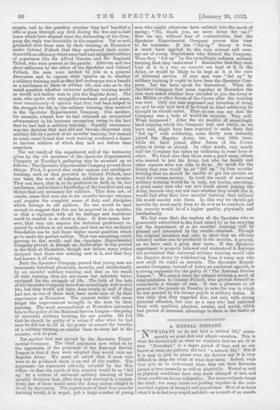" SPECTATOR" EXPERIMENTAL COMPANY.
rrHE gathering of members of the Spectator Experi- mental Company which took place last Tuesday at the headquarters of the Queen's Westminsters, kindly lent by that distinguished regiment, proved a most interesting gathering. As the members of the Company are scattered throughout the length and breadth not only of the country but of the Empire—at this moment some eleven are at Tientsin, serving in the ranks of the Somerset Light Infantry—only about thirty-five—chiefly those living in and near Loudon—were able to parade before Sir Edmond Elks. General Elles was able to compliment the men on the fact that they had forgotten vetb little of their drill. Of those present before him only n,bolit half a dozen were soldiers or Territorials. The rest were civilians, pure and simple, and to the question whether they had handled a rifle or gone through any drill during the five and a-half years which have elapsed since the disbanding of the Com- pany the reply was invariably in the negative. Yet so well grounded were these men by their training at Hounslow under Colonel Pollock that they performed their evolu- tions with an efficiency which surprised and delighted soldiers of experience like Sir Alfred Gaselee and Sir Reginald Talbot, who were present at the parade. After tea and two short addresses by the editor of the Spectator and Colonel Pollock, the men were invited to join in a general discussion and to express their opinion as to whether a military training such as they had undergone was a benefit or a hindrance to them in civilian life, and also as to the vexed question whether universal military training would or would not incline men to join the Regular Army. The men, who spoke with straightforwardness and good sense, were unanimously of opinion that they had been helped in the struggle for life by the military training they received in the Spectator Experimental Company. One speaker, for example, related bow he had obtained an unexpected advancement in his business occupation owing to the fact that he had had a military training. Equally unanimous was the decision that men did not become disgusted with military life by a period of six months' training, but instead in many cases found that such training awakened a desire to become soldiers of which they had not before been conscious.
The not result of the experiment and of the testimony given by the old members of the Spectator Experimental Company at Tuesday's gathering may be summed up as follows The Spectator Experimental Company proved three things. First, it proved that under zealous and intelligent training, such as that provided by Colonel Pollock, men can learn the work of infantry soldiers in six months. They can learn, that is, to be proficient in drill, to be fair marksmen, and to have a knowledge of the hundred and one things that are necessary for soldiers. This does not, of course, mean that men can in six months become veterans and acquire the complete sense of duty and discipline which belongs to old soldiers. No one would be mad enough to suggest that this can be acquired in six months, or that a regiment with all its feelings and traditions could be created in so short a time, It does mean, how- ever, that men can acquire the technical proficiency re- quired by soldiers in six months, and that on this technical foundation can be laid those higher moral qualities which go to make the perfect soldier. That was something worth proving to the world, and the .',:pectator Experimental Company proved it, though no doubt after it was proved in the flesh at Hounslow, though not before, many critics declared that there was nothing new in it, and that they had known it all along.
Next the Spectator Company proved that young men are immensely benefited physically, morally, and intellectually by six months' military training, and that as the result of such training they are not worse but infinitely bettor equipped for the struggle of life. The bulk of the lads of the Spectator Company have done exceedingly well in civil life, but they would not have done nearly so well if they had not, as one of them said, been made men of by their experiences at Hounslow. The present writer will never forget the improvement wrought in the men by their .training. The work accomplished at Hounslow converted him to the policy of the National Service League—thepolicy of universal military training for our youths. He felt that he should be guilty of a crime if after what lie had seen he did not do all in his power to extend the benefits of a military training on similar linos to every lad in the country, rich or poor.
Yet another fact was proved by the Spectator Experi- mental Company. The chief argument now relied on by the opponents of the proposals of the National Service League is that if they were adopted they would ruin our Regular Army. We must all admit that if such ruin were to be produced there is an end of the matter. The argument—an argument officially adopted by the War Office—is that the youth of this country would be so " fed up " by a system of universal military training of four months' duration that, after they had received it, compara- tively few of them would enter the Army unless obliged to do so by starvation. The experiences of their four months' training would, it is urged, put a large number of young men who might otherwise have enlisted into the mood of saying : " No, thank you, no more Army for me I " Now we say, without fear of contradiction, that the Spectator Experimental Company proves this view to be nonsense. If the " fed-up ' theory is true, it must have applied to the very normal and aver- age set of young Englishmen who formed the Company, Were they " fed up " by the exceedingly arduous military training that they underwent ? Remember that they were kept at it in a way no recruits are kept at it in the Army, or would be likely to be kept at it in the case of universal service. If ever men were " fed up " by military training it ought to have been the Spectator Com- pany. Let the facts speak for themselves. When the Spectator Company first came together at Hounslow the men were asked whether they intended to join the Army or the Militia or other forces of the Crown after the training was over. Only one man expressed any intention of doing so, and he only said that if he found he liked soldiering he thought he should enlist. Thus no one can say that the Company was a body of would-be recruits. Very well. What happened ? After the six months of exceedingly hard training which the Company had, and which, as we have said, might have been expected to make them feel " fed up " with soldiering, seine thirty men instantly joined the Regular Army, ten a very little later, while six have joined other forces of the Crown either at home or abroad. In other words, very nearly half the Company has taken up soldiering in some form or other. We know also that there were a good many others who wanted to join the Army, but who for family and other reasons were not able to do so. So much for the theory that men would be so " fed up " by four months' training that we should be unable to got the recruits we want for oversea service. In truth the result of universal military training would be to help, not hinder, recruiting. A great many men who are now timid about joining the Army, because they are not sure whether they would like it, would find after their four months' training that military life would exactly suit them. In this way we should get recruits far more easily than wo do now as to numbers, and the recruits would be of a higher quality, physically and intellectually.
We feel sure that the readers of the Spectator who so generously subscribed to the fund raised by us for carrying out the experiment of a six months' training will be pleased and interested by the results obtained. Though the original intention was only to show that an efficient infantry soldier can be produced in six months, it proved, as we have said, a great deal more. If the Spectator experiment is properly followed and understood it destroys the contention that universal military training would ruin the Regular Army by withdrawing from it many men who now swell its ranks as recruits. The Spectator Experi- mental Company, instead of being an argument against, is a strong argument for the policy of " The National Service League." We cannot leave the subject without a word of congratulation to Colonel Pollock, who proved himself so remarkable a trainer of men. It was a pleasure to all present at the parade on Tuesday to note the way in which he was greeted by his former pupils in military duties. It was clear that they regarded him, not only with strong personal affection, but also as a man who had endowed. them with qualities, physical, mental, and moral, which had proved of immense advantage to them in the battle of life.











































 Previous page
Previous page